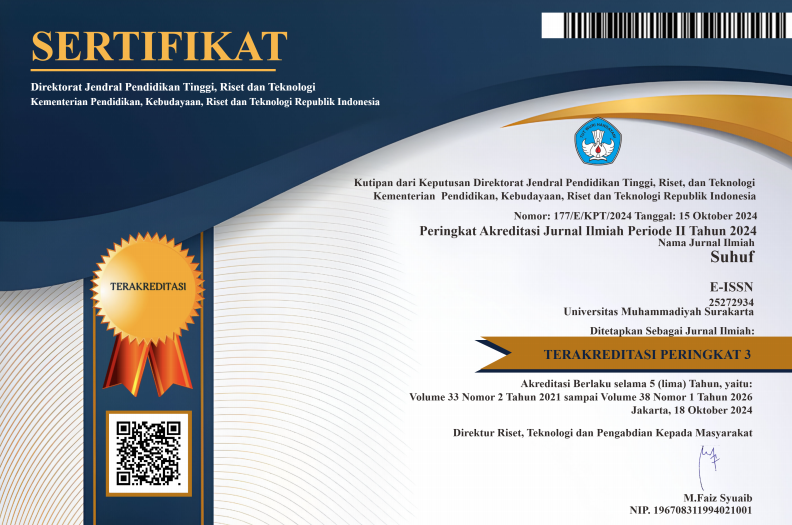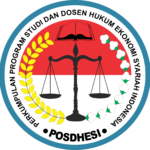Quantifying Intellectual Terrain: Islamic Jurisprudence, Ethical Discourse, and Scholarly Impact
DOI:
https://doi.org/10.23917/suhuf.v36i1.4367Keywords:
Islamic Jurisprudence, Ethical Discourse, Scholarly Impact, Islamic environment, Islamic lawAbstract
This research aims to reveal the trend and development of scientific literature about Islamic law, ethics, and its worldwide significance, spanning the years 1954 to 2023. The utilization of quantitative and network analysis enables the mapping of alterations in publication patterns, the identification of affiliations and highly productive authors, and the highlighting of journals with substantial influence. The findings indicate a significant increase in the number of published works since 1995, particularly in the early 21st century. Notably, the International Islamic University Malaysia and writers El-Seoudi, A.W.M.M. and Jadalhaq, I.M. have made considerable contributions to this surge. The examination of journals emphasizes the significant influence of "Islamic Law and Society" in the relevant literature. Furthermore, specific works like Ashraf D's publication in the "Journal of Business Ethics" in 2016 demonstrate a considerable impact in the scientific literature. Through a comprehensive examination of publication trends and influential works, the study contributes to a deeper understanding of Islamic law and ethics within academic circles. It underscores the need for interdisciplinary collaboration and engagement with diverse perspectives to grasp the complexities of Islamic jurisprudence and ethical frameworks. In conclusion, this research provides a valuable resource for scholars, policymakers, and practitioners seeking to navigate the intricate terrain of Islamic law and ethics. By delineating trends, identifying key contributors, and highlighting influential publications, the study offers a nuanced perspective on the evolving discourse surrounding these critical subjects.
Downloads
References
K. Anwar and M. S. Apriantoro, “Exploring the Permissibility of Mahar in the Form of Stocks in Islamic Law,” Ethica Int. J. Humanit. Soc. Sci. Stud., vol. 1, no. 1, pp. 28–33, 2023, [Online]. Available: https://garuda.kemdikbud.go.id/documents/detail/3886789
M. S. Apriantoro and R. D. P. Rosadi, “The Influence of Al-Usul Al-Khamsah on The Mu’tazila’s Law Thought,” in PROCEEDINGS: Dirundeng International Conference on Islamic Studies, 2021, pp. 85–94. doi: https://doi.org/10.47498/dicis.v1i1.1043.
M. S. Apriantoro, M. N. I. Alis, S. Septianozakia, and D. Setiana, “Comparing KHI and KHES in Marital Property Grant Disputes: An Analysis of Judges’ Views,” Al-Istinbath J. Huk. Islam, vol. 8, no. 1 May, pp. 37–52, 2023, doi: http://dx.doi.org/10.29240/jhi.v8i1.6464.
M. Apriantoro, A. Suryaningsih, and M. Muthoifin, “Bibliometric Analysis of Research Development of Economic Dispute Settlement,” in Proceedings of the 5th International Graduate Conference in Islam and Interdisciplinary Studies, IGCIIS 2022, 19-20 October 2022, Mataram, Lombok, Indonesia, 2023, pp. 1–9. doi: http://dx.doi.org/10.4108/eai.19-10-2022.2329068.
E. Sulistiawati, I. Rosyadi, A. Akbar, and M. S. Apriantoro, “Review of Islamic Law against Multi-Contract on Electronic Money in LinkAja Application,” in Proceedings Book The International Conference On Islamic Economics, Islamic Finance, & Islamic Law (ICIEIFIL), 2023, pp. 58–69. [Online]. Available: https://proceedings.ums.ac.id/index.php/icieifil/article/view/2629
M. S. Apriantoro, E. R. Puspa, D. I. Yafi, D. A. Putri, and R. I. Rosyadi, “Beyond Mortgages: Islamic Law and the Ethics of Credit Financing for Public Housing,” Profetika J. Stud. Islam, vol. 24, no. 02, pp. 196–206, 2023, doi: https://doi.org/10.23917/profetika.v24i02.1795.
A. N. Sholeh, N. Saputra, and A. H. Manurung, “The Awareness of Islamic Law as a Spiritual Factor in Family Resilience and Parenting Quality During the Covid-19 Era,” J. Indones. Islam, vol. 15, no. 2, pp. 329–358, 2021, doi: http://dx.doi.org/10.15642/JIIS.2021.15.2.329-358.
J. Rehman, “The Sharia, Islamic Family Laws and International Human Rights Law: Examining the Theory and Practice of Polygamy and Talaq,” Int. J. Law, Policy Fam., vol. 21, no. 1, pp. 108–127, 2007, doi: https://doi.org/10.1093/lawfam/ebl023.
Z. Mansyur, “Self-Esteem and Fixed Price in Islamic Law (A Critical Study of the Pesuke Tradition among the Nobles of the Sasak Tribe of Lombok),” Al-Ihkam J. Huk. dan Pranata Sos., vol. 16, no. 1, pp. 180–206, 2021, doi: https://doi.org/10.19105/al-lhkam.v16i1.4996.
M. S. Apriantoro and A. E. Nuraini, “Social Network Analysis of the Development of the Halal Industry in Indonesia,” Bull. Soc. Informatics Theory Appl., vol. 6, no. 2, pp. 102–110, 2022, doi: https://doi.org/10.31763/businta.v6i2.553.
M. S. Apriantoro, R. Mellinia, S. G. Maheswari, and H. Hudaifah, “Islamic Financial Research Directions During Pandemic: A Bibliometric Analysis,” At-Taradhi J. Stud. Ekon., vol. 13, no. 2, pp. 75–97, 2022, doi: https://doi.org/10.18592/at-taradhi.v13i2.7174.
M. S. Apriantoro, J. Herviana, Y. Yayuli, and S. Suratno, “Sharia Financial Literacy: Research Trends and Directions for Future Inquiry,” J. Islam. Econ. Laws, vol. 6, no. 2, pp. 19–40, 2023, doi: https://doi.org/10.23917/jisel.v6i2.22396.
W. Jauhari, A. W. A. Muhaimin, and M. D. A. Khan, “Implementation of The Concept of’Urf and Maslahah in Buying and Selling Gold With Non-Cash Payment (Comparative Study of Fatwa DSN-MUI and Fatwa Al-Lajnah Ad Dāimah Li Al-Buhūṡ Al-‘Ilmiyyah Wa Al-Iftā’Saudi Arabia),” Suhuf Int. J. Islam. Stud., vol. 35, no. 1, pp. 54–65, 2023, doi: https://doi.org/10.23917/suhuf.v35i1.22638.
I. Safi’i and W. Tarmini, “The Impact of Al Islam and Muhammadiyah Development on Integrity, Obedience, and Involvement in Muhammadiyah Organizations,” SUHUF, vol. 35, no. 1, pp. 1–11, 2023, doi: https://doi.org/10.23917/suhuf.v35i1.21741.
L. Lundberg, “Bibliometric Mining of Research Directions and Trends for Big Data,” J. Big Data, vol. 10, no. 112, pp. 1–27, 2023, doi: https://doi.org/10.1186/s40537-023-00793-6.
E. A. Pacheco-Velázquez, J. C. Vázquez-Parra, M. Cruz-Sandoval, D. E. Salinas-Navarro, and M. Carlos-Arroyo, “Business Decision-Making and Complex Thinking: A Bibliometric Study,” Adm. Sci., vol. 13, no. 3, pp. 1–17, 2023, doi: https://doi.org/10.3390/admsci13030080.
J. Liu, M. Cui, Y. Wang, and J. Wang, “Trends in Parthenolide Research Over the Past Two Decades: A Bibliometric Analysis,” Heliyon, vol. 9, no. 7, pp. 1–17, 2023, doi: https://doi.org/10.1016/j.heliyon.2023.e17843.
M. S. Apriantoro, Y. F. W. Pradana, A. El Ashfahany, and D. Setiana, “Analyzing and Mapping Csr Impact And Trends: A Bibliometric Study on Community Empowerment,” Ekon. dan Bisnis Berk. Publ. Gagasan Konseptual, Has. Penelitian, Kajian, dan Terap. Teor., vol. 27, no. 2, pp. 118–132, 2023, doi: https://doi.org/10.24123/jeb.v27i2.5873.
A. Virani, A. M. Wellstead, and M. Howlett, “Where is the policy? A bibliometric analysis of the state of policy research on medical tourism,” Glob. Heal. Res. Policy, vol. 5, no. 19, pp. 1–16, 2020, doi: https://doi.org/10.1186/s41256-020-00147-2.
N. Wang, G. Tang, B. Jiang, Z. He, and Q. He, “The Development of Green Enterprises: A Literature Review Based on VOSviewer and Pajek,” Aust. J. Manag., vol. 48, no. 2, pp. 1–22, 2021, doi: https://doi.org/10.1177/03128962211035470.
H. Li, “An Empirical Study on the Knowledge Structure and Hotspot Mapping of Reverse Innovation Based on VOSviewer Software and Big Data,” in Applied Mathematics, Modeling and Computer Simulation, vol. 30, 2022, pp. 998–1006. doi: http://dx.doi.org/10.3233/ATDE221125.
Downloads
Submitted
Accepted
Published
How to Cite
Issue
Section
License
Copyright (c) 2024 Muhamad Subhi Apriantoro, Safina Faradilla, Afief El Ashfahany, Aminudin Maruf, Nur Amalia Aziza

This work is licensed under a Creative Commons Attribution 4.0 International License.


















